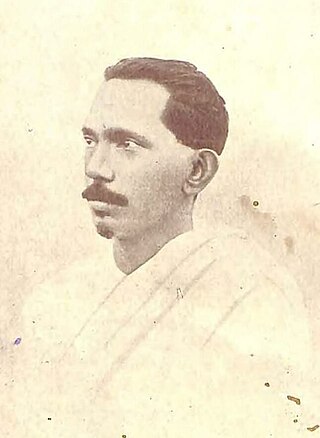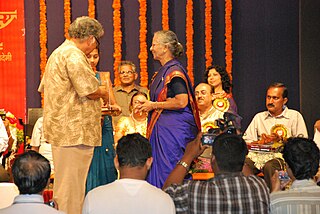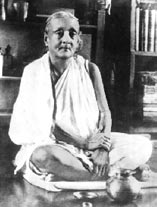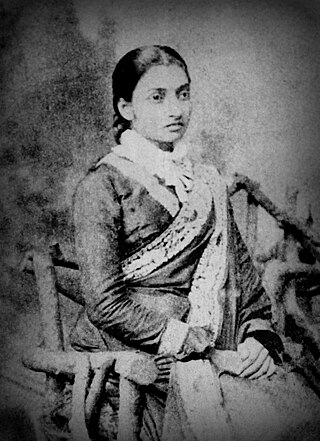
Sri Sarada Devi, born Kshemankari / Thakurmani / Saradamani Mukhopadhyay, was the wife and spiritual consort of Ramakrishna Paramahamsa, a nineteenth-century Hindu mystic. Sarada Devi is also reverentially addressed as the Holy Mother by the followers of the Sri Ramakrishna monastic order. The Sri Sarada Math and Ramakrishna Sarada Mission situated at Dakshineshwar is based on the ideals and life of Sarada Devi. She played an important role in the growth of the Ramakrishna Movement.

Sarat Chandra Chattopadhyay, was a Bengali novelist and short story writer of the early 20th century. He generally wrote about the lives of Bengali family and society in cities and villages. However, his keen powers of observation, great sympathy for fellow human beings, a deep understanding of human psychology, an easy and natural writing style, and freedom from political biases and social prejudices enable his writing to transcend barriers and appeal to all Indians. He remains the most popular, translated, and adapted Indian author of all time.

Satyendranath Dutta was a Bengali poet and is considered the "wizard of rhymes". Satyendranath Dutta was an expert in many disciplines of intellectual enquiry including medieval Indian history, culture, and mythology.

Ashapurna Devi, also Ashapoorna Devi or Ashapurna Debi, was a prominent Indian novelist and poet in Bengali. In 1976, she was awarded the Jnanpith Award and Padma Shri by the Government of India, D.Litt. by the Universities of Jabalpur, Rabindra Bharati, Burdwan and Jadavpur. Vishwa Bharati University honoured her with Deshikottam in 1989. For her contribution as a novelist and short story writer, the Sahitya Akademi conferred its highest honour, the Sahitya Akademi Fellowship, in 1994.

Sabitri Chatterjee is an Indian actress who is known for her work in Bengali theatre and cinema. Her career spans more than 60 years. She is the recipient of BFJA Awards for two times. In 1999, she was conferred with Sangeet Natak Akademi Award for acting in Bengali theatre. In 2013, she was awarded by the Government of West Bengal its highest civilian award; the Banga Bibhushan. In 2014, Government of India conferred upon her its fourth-highest civilian award the Padma Shri.

The Bengali Night is a 1988 semi-autobiographical film based upon the Mircea Eliade 1933 Romanian novel, Bengal Nights, directed by Nicolas Klotz and starring Hugh Grant, Soumitra Chatterjee, Supriya Pathak and Shabana Azmi.

Bhuvana Natarajan was an Indian translator and short story writer. She published over 20 books and in 2009 was awarded the Sahitya Akademi Translation Prize for translation from Bengali to Tamil. Many of her short stories have appeared in Kalki, Mangaiyar Malar, Saavi, Sumangali, Jnana Bhoomi, Idhayam Pesugiraday and Gokulam. She was able to read, write and converse in Tamil, Bengali, Hindi, English and had working knowledge of Sanskrit. She lived in Calcutta for over 43 years and later in Chennai.

Sarasibala Basu (1886–1929) was a novelist, story teller, poet from the Bengal region of the Indian subcontinent. She belonged to the generation of writers of the Bengali Renaissance. In her short lifespan, she had published more than twenty novels, many short stories and poems, and made a big impact on Bengali literature. An equal quantity of her writings had remained unpublished. Sarasibala wrote passionately about the social issues of that period and the world around her.

Yogin Ma, born Yogindra Mohini Biswas, was one of the principal female disciples of Sarada Devi, the wife and spiritual consort of the Hindu mystic Ramakrishna. Together with Gopaler Ma, she was a constant companion of Sarada Devi, revered as the holy mother in the monastic order of Ramakrishna.
Kapalkundala is a Bengali romance novel by Indian writer Bankim Chandra Chattopadhyay. Published in 1866, it is a story of a forest-dwelling girl named Kapalkundala, who fell in love with and married Nabakumar, a young gentleman from Saptagram, but eventually found that she is unable to adjust herself with the city life. Following the success of Chattopadhyay's first novel Durgeshnandini, he decided to write about a girl who is brought up in a remote forest by a Kapalika and never saw anyone but her foster-father. The story is set in Dariapur, Contai in modern-day Purba Medinipur district, Paschimbanga where Chattopadhyay served as a Deputy Magistrate and Deputy Collector.
Durgeshnandini is a Bengali historical romance novel written by Indian writer Bankim Chandra Chattopadhyay in 1865. Durgeshnandini is a story of the love triangle between Jagat Singh, a Mughal General, Tilottama, the daughter of a Bengali feudal lord and Ayesha, the daughter of a rebel Pathan leader against whom Jagat Singh was fighting. The story is set against the backdrop of Pathan-Mughal conflicts that took place in south-western region of modern-day Indian state of Paschimbanga during the reign of Akbar.

Golap Ma was a direct householder disciple of Sri Ramakrishna, the 19th-century mystic and saint, and a foremost companion of Sri Sarada Devi, his spiritual consort and the Holy Mother of Ramakrishna Order, along with her other companion, Yogin Ma. Her real name was Annapurna Devi, or Golap Sundari Devi. She was also referred to as a "grief-stricken Brahmani" in the Gospel of Sri Ramakrishna. She played a very important role in the early development of the Sri Ramakrishna movement and stayed, until her death, in Udbodhan, the house where the Holy Mother stayed in Calcutta. She was popular as Golap Ma among the devotees of the Ramakrishna Order.

Ishti Kutum is a Bengali television serial that aired from 24 October 2011 to 13 December 2015 on Star Jalsha. It began telecasting daily from 3 May 2015 and was in the same slot 6:30 PM IST from the beginning to the end. The show was produced by Magic Moments Motion Pictures company. This is the first serial produced by Magic Moments Motion Pictures on Star Jalsha as well as the longest running serial of Magic Moments Motion Pictures till now. The show went on-air on 24 October 2011. It starred Raneeta Das, Rishi Kaushik and Ankita Chakraborty in lead roles. After successfully running for four years, Ishti Kutum went off-air on 13 December 2015.

Jnanadanandini Tagore was a social reformer who pioneered various cultural innovations and influenced the earliest phase of women's empowerment in 19th century Bengal. She was married to Satyendranath Tagore, Rabindranath Tagore's elder brother, and a scion of the Jorasanko Tagore Family. She is known today for developing a unique style of sari, the Brahmika sari, based on both the traditional Bengali style, with elements from Gujarati and Parsi style drapes she encountered while living in Bombay.
Datta is a 1951 Bengali romantic drama film directed by Soumyen Mukhopadhyay and released under the banner of S. B. Production. The film is based on the novel with the same name written by Sarat Chandra Chattopadhyay. The film was remade twice: in 1976 and later in 2023.

Karunamoyee Rani Rashmoni was an Indian Bengali historical drama television series which aired on Bengali Entertainment Channel Zee Bangla and is also available on the digital platform ZEE5. It was premiered on 24 July 2017. The serial was earlier produced by Subrata Roy and then it was produced by Zee Bangla. It completed 1,000 episodes on its third birthday and 1,500 episodes on 26 December 2021. After a successful run of 4+1⁄2 years, Karunamoyee Rani Rashmoni went off-air on 13 February 2022.
Jatugriha is a 1964 Indian Bengali social drama film directed by Tapan Sinha and produced by Uttam Kumar based on the novel of the same name by Subodh Ghosh. The film was produced and released on 20 March 1964 under the banner of Uttam Kumar Films Private Limited. The music of the film was composed by the legendary Ashish Khan. This was the fifth film produced by Uttam Kumar. A 1987 Bollywood film Ijaazat, directed by Gulzar, follows a similar plot. The film stars Uttam Kumar, Arundhati Devi, Anil Chatterjee and Bikash Roy.It was Bengali classic movie of 1964.
Subarnalata was a Bengali television series that originally aired on Zee Bangla in 2010, and was based on the second part of the book trilogy by Ashapoorna Devi of the same name. It premiered from April 2010 at 6pm and was shifted to 8:30pm from July 2010. During the lock-down imposed in March 2020 due to the COVID-19 pandemic, all shooting at sets was shut. Following huge audience request, Subarnalata began re-telecasted. This Show is 3rd time repeat telecast on Zee Bangla Cinema on 30 June 2024.

Prothoma Kadambini is an Indian Bengali television biographical period drama based on the biography of the first practising female physician of British-ruled India and South Asia, Doctor Kadambini Ganguly. The show aired on Bengali General Entertainment Channel Star Jalsha and is also available on digital platform Hotstar, that was premiered on 16 March 2020. The show is produced by Shree Venkatesh Films and stars Solanki Roy and Honey Bafna in lead roles. The show went to off-air on 28 February 2021.

Soudaminir Sansar was an Indian Bengali-language television drama which premiered on 17 June 2019. It was broadcast on Bengali General Entertainment Channel Zee Bangla and is also available on the digital platform ZEE5, and SEEFlix, even before TV telecast. The series starring Susmili Acharjee and Adhiraj Ganguly. The story line set in the 1950s and the period often referred to as the Golden era of Bengal.















